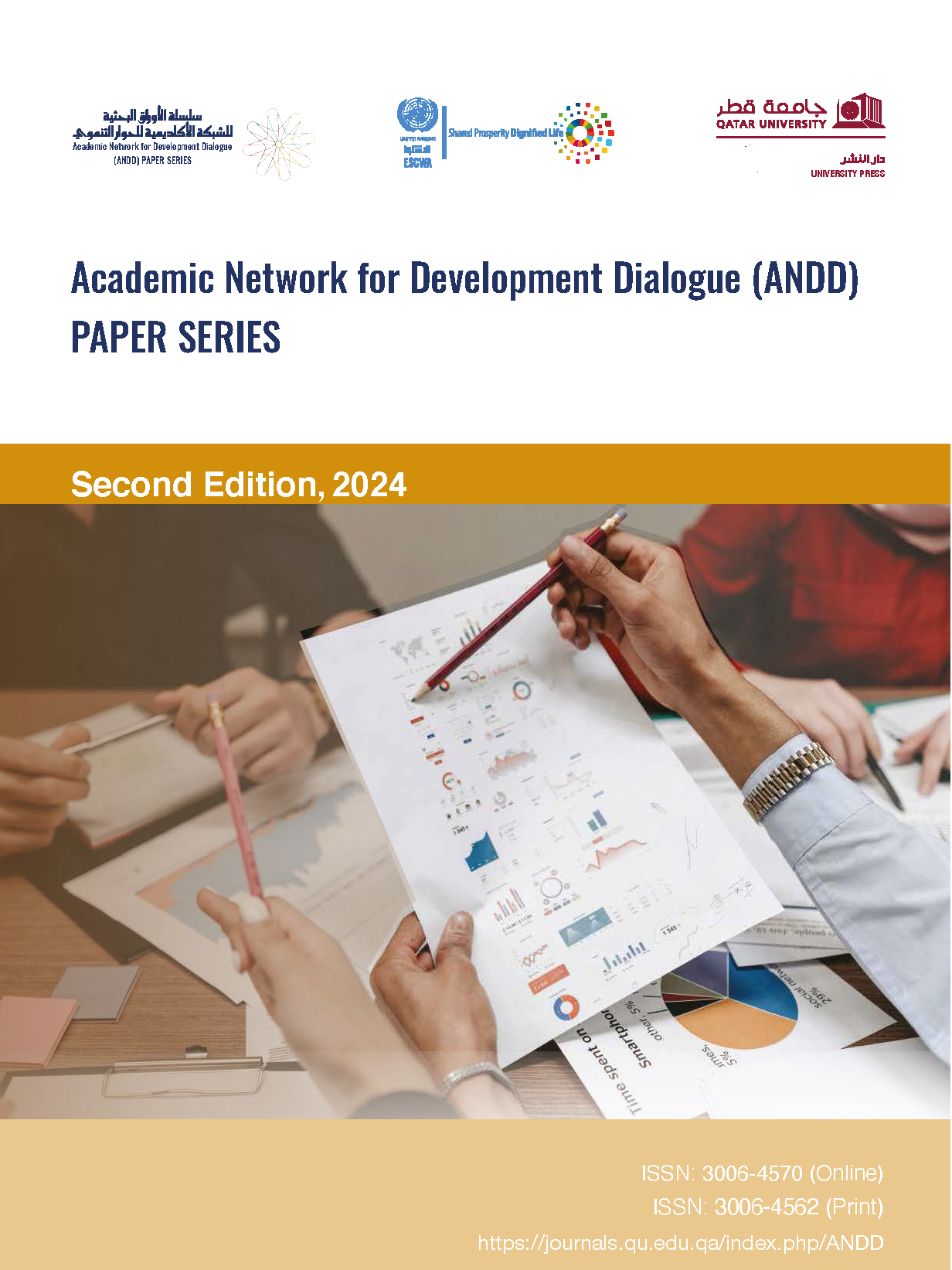Skills Development in the Era of Artificial Intelligence: A Sustainable Vision for well-being
Abstract
The research highlights the importance of skill development as a means of adapting to the latest technological transformations, notably artificial intelligence (AI). Research indicates the existence of what is known as a skills gap, where technological transformations, especially those supported by AI, tend to eliminate intermediate skills while increasing both high and low-level skills, thus causing structural imbalances in the job market. Recent studies suggest that approximately 40% of the global workforce is vulnerable to AI, with variations among advanced economies, emerging markets, and low-income countries. Policymakers find themselves facing the challenge of job-role mismatch, necessitating individuals to acquire new skills and enhance their capabilities to meet the demands of the evolving job market. Maximizing their income enables individuals to expand their life choices, leading to improved spending on health and education, thus enhancing individual well-being and living standards, prompting them to seek faster and more effective means of income maximization and, consequently, personal well-being. The research indicates that addressing this challenge is not solely the responsibility of individuals but also involves educational institutions and decision-makers. It proposes the need for sustainable and innovative educational curricula that promote the development of core skills, increased government intervention to serve the labor market by reducing skill gaps crucial for tackling unemployment amid these rapid transformations, as well as building bridges between education, training, industry, and business sectors in general. It also advocates for initiatives, especially in higher education, to acquire new skills and develop existing ones.
##plugins.themes.bootstrap3.article.details##
SkillsJob marketArtificial intelligenceTrainingWell-being
Alekseeva, L., Azar, J., Giné, M., Samila, S., & Taska, B. (2021). The demand for AI skills in the labor market. Labour Economics, 71. https://doi.org/10.1016/j.labeco.2021.102002. Retrieved from: https://www.sciencedirect.com/science/article/pii/S0927537121000373
Bertuzzi, L.(2023, November 9). OECD updates definition of Artificial Intelligence ‘to inform EU’s AI Act’. EURACTIV MEDIA NETWORK. Retrieved from: https://www.euractiv.com/section/artificial-intelligence/news/oecd-updates-definition-of-artificial-intelligence-to-inform-eus-ai-act/#]
Boahin, P., & Hofman, W. H. A. (2014). Perceived effects of competency-based training on the acquisition of professional skills. International Journal of Educational Development, 36. Retrieved from: https://www.sciencedirect.com/science/article/pii/S0738059313001016. https://doi.org/10.1016/j.ijedudev.2013.11.003
Cazzaniga, M., Jaumotte, F., Li, L., Melina, G., Panton, A. J., Pizzinelli, C., Rockall, E. J., & Tavares, M. M. (2024). Gen-AI: Artificial Intelligence and the Future of Work. International Monetary Fund. Retrieved from: https://www.imf.org/en/Publications/Staff-Discussion-Notes/Issues/2024/01/14/Gen-AI-Artificial-Intelligence-and-the-Future-of-Work-542379?cid=bl-com-SDNEA2024001.
Corporate author. (2013). Building better formal TVET systems : Principles and practice in low- and middle-income countries. UNESCO, World Bank, International Labour Organization. Retrieved from: https://unesdoc.unesco.org/ark:/48223/pf0000386135.
Costa, R., Liu, Z., McNally, S., Murphy, L., Pissarides, C., Rohenkohl, B., Valero, A., & Ventura, G. (2023, October). Learning to grow: How to situate a skills strategy in an economic strategy. Resolution Foundation. Retrieved from: https://economy2030.resolutionfoundation.org/wp-content/uploads/2023/10/Learning-to-grow-report.pdf
Cournoyer, M. (2019, August 21). The Future of Work and Skills Acquisition – A shift in mindset is needed. Job Market Monitor. Retrieved from: https://jobmarketmonitor.com/2019/08/21/skills-acquisition-a-shift-in-mindset-is-needed/
Fabian Stephany, Ole Teutloff (2023). What is the Price of a Skill? The Value of Complementarity. Research Policy. Retrieved from: https://papers.ssrn.com/sol3/papers.cfm?abstract_id=4234078
Green, A. (2023). Intelligence artificielle et emploi : aucun signe de fléchissement de la demande de main-d’œuvre (pour l’instant). OCDE. https://doi.org/10.1787/aae5dba0-fr
Green, A., & Lamby, L. (2023). The supply, demand and characteristics of the AI workforce across OECD countries. OECD Social, Employment and Migration Working Papers, No. 287. https://doi.org/10.1787/bb17314a-en
Guarascio, D., Reljic, J., & Stöllinger, R. (2023). Artificial Intelligence and Employment: A Look into the Crystal Ball (GLO Discussion Paper No. 1333). Global Labor Organization (GLO). Retrieved from: https://www.econstor.eu/bitstream/10419/278106/1/GLO-DP-1333.pdf
Hentschel, J. (2017). Skills or jobs: Which comes first? IZA World of Labor, 339. https://doi.org/10.15185/izawol.339
International Labour Office. (2010). A Skilled Workforce for Strong, Sustainable and Balanced Growth: A G20 Training Strategy. Geneva. Retrieved from: https://www.oecd.org/g20/summits/toronto/G20-Skills-Strategy.pdf
Kavanagh, C. (2019). New Tech, New Threats, and New Governance Challenges: An Opportunity to Craft Smarter Responses? In Report Part Title: Artificial Intelligence. Carnegie Endowment for International Peace. Retrieved from: https://carnegieendowment.org/files/WP_Camino_Kavanagh___New_Tech_New_Threats1.pdf
Lassebie, J. (2023). Skill Needs and Policies in the Age of Artificial Intelligence. Organization for Economic Co-operation and Development (OECD). Retrieved from : https://www.oecd-ilibrary.org/sites/08785bba-en/1/3/5/index.html?itemId=/content/publication/08785bba en&_csp_=9f4368ffe3fc59de4786c462d2cdc236&itemIGO=oecd&itemContentType=book#tablegrp-d1e16959-12b89ec173
Maslej, N., Fattorini, L., Brynjolfsson, E., Etchemendy, J., Ligett, K., Lyons, T., Manyika, J., Ngo, H., Niebles, J. C., Parli, V., Shoham, Y., Wald, R., Clark, J., & Perrault, R. (2023). The AI Index 2023 Annual Report. AI Index Steering Committee, Institute for Human-Centered AI, Stanford University. https://aiindex.stanford.edu/wp-content/uploads/2023/04/HAI_AI-Index-Report_2023.pdf
Mok, A. (2023). Want a pay bum p? Learn how to use AI. Here's how much the skill could be worth based on your job. Business Insider. Retrieved from: https://www.businessinsider.com/how-to-get-job-ai-skills-pay-raise-work-2023-12
Nurkin, T., & Rodriguez, S. (2019). A Candle in the Dark: US National Security Strategy for Artificial Intelligence. In Report Part Title: INTRODUCTION. Atlantic Council. Retrieved from: https://www.atlanticcouncil.org/wp-content/uploads/2019/12/AC_CandleinDark120419_FINAL.pdf
OECD.AI (2024), visualisations powered by JSI using data from LinkedIn, accessed on 6/6/2024, www.oecd.ai.
OECD.AI (2024), visualisations powered by JSI using data from www.adzuna.co.uk, accessed on 6/6/2024, www.oecd.ai.
Robert Half. (2023, October 9). What skills does the workplace of the future need in Australia? Retrieved from: https://www.roberthalf.com/au/en/insights/research/what-skills-does-workplace-future-need-australia
Salesians. (2017, November 24). Italy - Dual Education System in Vocational Training: a success that requires regulatory stabilization. ANS. Retrieved from: https://www.infoans.org/en/sections/news/item/4405-italy-dual-education-system-in-vocational-training-a-success-that-requires-regulatory
Sanusi, I. T., Olaleye, S. A., Agbo, F. J., & Chiu, T. K. F. (2022). The role of learners’ competencies in artificial intelligence education. Computers and Education: Artificial Intelligence, 3, 100098. https://doi.org/10.1016/j.caeai.2022.100098
Stanford University. (2023). The 2023 Stanford AI Index. Retrieved from: https://aiindex.stanford.edu/ai-index-report-2023/#individual-chapters
Sung, J., & Ramos, C. (Eds.). (2014). Skills strategies for an inclusive society: The role of the state, the enterprise and the worker. Institute for Adult Learning, Singapore. Retrieved from: https://web.archive.org/web/20150501122705/http://www.ial.edu.sg/files/documents/564/Skills-Strategies-for-an-Inclusive-Society.pdf
Wilson, H., Daugherty, P., & Morini-Bianzino, N. (2017). The Jobs That Artificial Intelligence Will Create. Retrieved from: https://sloanreview.mit.edu/article/will-ai-create-as-many-jobs-as-it-eliminates/
Zhoum, Q. (2023). Research progress on the impact of artificial intelligence on the labor market. Advances in Economics and Management Research, 8. Retrieved from: https://www.michaelwebb.co/webb_ai.pdf



 https://orcid.org/0000-0003-4600-7315
https://orcid.org/0000-0003-4600-7315